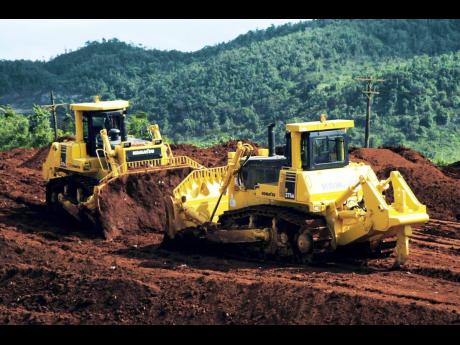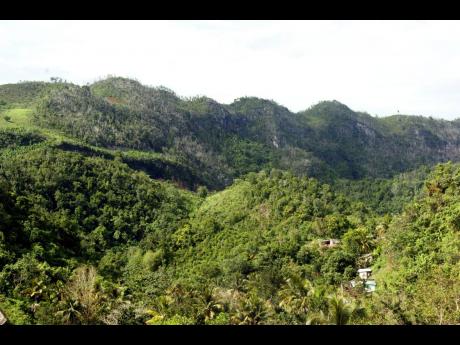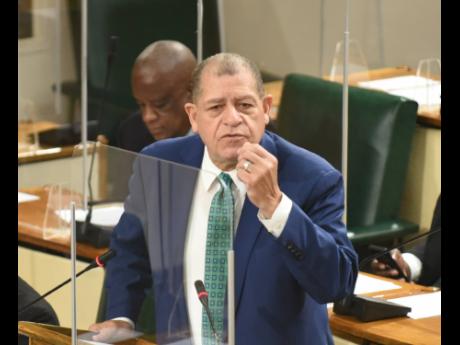Editorial | Engage bauxite stakeholders
It is hardly surprising that the Supreme Court rejected the Government’s claim against the right of the NGO, Southern Trelawny Environment Agency (STEA), to be a party in the constitutional challenge of its granting of a licence for the mining of bauxite in the periphery of the Cockpit Country. And this newspaper would be similarly surprised if the administration prevailed, should it appeal the court’s recent ruling.
But what, though, is surprising is the failure of the two most recent ministers with responsibility for mining – Robert Montague and Audley Shaw – to, thus far, act on our suggestion for a reset of the bauxite-alumina industry.The starting point of this should be full and frank discussions between all stakeholders, including the industry’s harshest critics, about the state of the sector, its contribution to the economy, and the harm – real and perceived – it causes to the environment.
Proponents of the industry insist that in its nearly three-quarters of a century in Jamaica, bauxite mining and alumina refining have helped to bring modern production to the island; transferred technology and skills; created good-paying jobs; earned foreign exchange from exports; and helped to uplift communities near to mines and refineries. In other words, the bauxite/alumina industry has been good for Jamaica.
Its critics, especially environmentalists, contend, however, that any economic gain from the industry is outweighed by the harm it causes to the environment and to people’s health, and the dislocation it leaves in rural communities. Indeed, a 2020 review of the sector in a series of essays commissioned by the NGO, Jamaica Environment Trust (JET), concluded that there was no basis for a positive declaration of the industry’s net contribution to the economy, because of a lack of detailed analyses.
JET, nonetheless, has called for a transitioning out of the industry, which, depending on whose data on bauxite deposits is employed, can continue from anywhere between three decades and 100 years.
This newspaper, even as it accepts the industry’s several shortcomings, believes that bauxite/alumina has brought value to Jamaica – and can still do so. It would be folly to march the industry prematurely to its demise – not without an opportunity to attempt to fix its weakness, or without a defined and credible alternative to the sector.
CONSTITUTIONAL PROVISION
However, any such assessment demands dialogue, which has to be led by government policymakers. There is no evidence, unfortunately, that this is happening. Instead, positions appear to have hardened – and could get worse.
The latest controversy is the court case in which the STEA and a resident of the Cockpit Country – a mountainous and ecologically sensitive region of karsts in northern Jamaica – are seeking to overturn a permit the Government granted for mining in and outside of the officially designated Cockpit Country Protected Area (CCPA), which critics say is too narrowly defined.
While mining is prohibited within the CCPA, STEA and Farmer Clifton are attempting to invoke a provision in Jamaica’s Constitution that protects people’s “right to enjoy a healthy and productive environment free from the threat of injury or damage from environmental abuse and degradation of the ecological heritage”.
The claimants were granted an injunction preventing Discovery Bauxite Partners (DBP) from commencing mining. The Government challenged STEA’s bona fides to be part of the case, on the grounds that it was not a natural person and could not therefore seek the protection of the constitutional provision.
Justice Sonya Wint-Blair dismissed the claim, saying that the provision of the Charter of Fundamental Rights and Freedoms, guaranteeing protection to “any person” whose rights are infringed, was not limited to natural persons.
“Any other interpretation would result in an absurdity, lead to legal and factual anomalies, and would be, in my view, asking the court to apply the law in a manner which would lead to the disadvantage of many,” Justice Wint-Blair wrote.
INDEPENDENT COST-VALUE ANALYSIS
The Government’s move to dislodge the STEA from the case was more glaring – and some claim, galling – in the face of an earlier complaint that the administration had failed, or was extremely slow, to respond to a request for information from the Inter-American Commission on Human Rights (IACHR), after the STEA and residents of the Cockpit Country had filed a complaint with the IACHR relating to the same issue, claiming historic damage to their health and livelihoods from bauxite mining.
The Government has a right, in a legal setting, to defend its policy as well as the technical legitimacy of the portion of the Cockpit Country it has protected. But (those and) engaging citizens on the future of the bauxite industry are not mutually exclusive.
We again suggest to Minister Shaw that he commissions an independent cost-value analysis of the industry’s impact on Jamaica and the prospects for the future. At the same time, the Jamaica Bauxite Institute should be resuscitated, and repurposed, as a credible research and oversight agency for the industry, with the primary role of preserving Jamaica’s interest.
More critically, Mr Shaw and his technocrats should begin those talks with people who are (negatively) impacted in their daily lives by bauxite mining and refinery, and those who are concerned about its effects on the environment.
These discussions will be uncomfortable for the minister. But it is better to have them in a search for understanding, rather than merely allow resentments to fester. Mr Shaw may well discover the formula for a bauxite reset.



